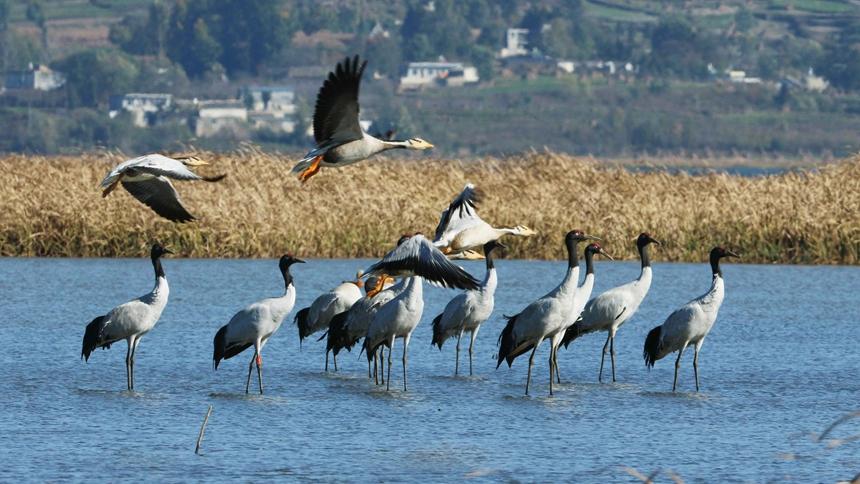Feature: Sustained passion of bird lovers evident in SW China
KUNMING, Nov. 25 (Xinhua) -- Each year from November to March, Cuihu Park in central Kunming, capital of southwest China's Yunnan Province, transforms into a haven for migratory birds.
Thousands of black-headed gulls travel from far distant places, such as Siberia, and gather in a city famous for its all-year spring-like climate. The striking red-beaked, white-feathered gulls draw crowds of visitors to Kunming.
For 58-year-old Lyu Guoqiang, this season marks his annual return to the park -- not as a tourist, but as a volunteer bird protector.
"Every morning, I patrol the lake, watching over the gulls," Lyu said. "If we spot a sick bird, we take a boat to rescue it and send it to a wildlife rescue station. We also educate visitors on proper feeding practices -- encouraging them to use grain formulated for the birds' health."
Lyu has volunteered as a bird protector for six years. The park employs a seasonal team of six to 10 guards like Lyu to take care of the black-headed gulls, said Chen Wen, office director of Cuihu Park.
A Kunming native, Lyu's connection to the black-headed gulls runs deep. "I've loved these birds since childhood," he said. "I used to photograph them, then I brought my children, and now I bring my grandchildren to see them."
The gulls began wintering in Yunnan in the 1980s. Lyu has noted a decline in their numbers at Cuihu Park over the past decade -- but sees this as a positive sign.
"The improved urban environment has created more habitats for them," he explained. "Now, the gulls are also found in places such Dianchi Lake and Erhai Lake in Dali."
According to Chen, many residents share a deep affection for the gulls, much like Lyu. Among them, the story of an elderly man and the gulls that took place in the 20th century still resonates deeply.
Wu Qingheng, a childless man who lived alone, developed a unique bond with the black-headed gulls. Each day, Wu walked more than 10 kilometers to the lake to feed the birds, dedicating over half of his monthly pension to buying their feed. He continued this routine for years, until his death.
"Though the 'seagull elder' passed away more than 20 years ago, his connection with the gulls has become a cherished legacy," Chen said. "In 2006, a statue was erected in the park in his honor."
According to Chen, Cuihu Park, known as the "eye of Kunming" to local people, is also home to a growing diversity of birds -- including egrets, nightingales and common moorhens. The number of bird species observed in the park has increased from 25 three years ago to the current 95, and includes eight protected species.
"Birds are the best indicator of the environment," Chen noted, adding that the growing diversity of birds is a testament to the improvement of the local ecological environment.
Notably, more bird lovers have joined in ecological conservation efforts. Li Weiwei, a researcher at the Kunming Institute of Zoology under the Chinese Academy of Sciences, is one of those to contribute to this improved biodiversity.
In 2021, she and her team worked with Cuihu Park staff in creating a floating bird island to provide roosting habitats for herons and other aquatic birds. They expanded this initiative in 2024, adding a nocturnal island for forest birds and herons.
"The bird islands help counter urban wildlife habitat fragmentation. In the future, we will implement more ways of creating micro-habitats for birds in different ecological environments," Li said, adding that they've also introduced many bird-friendly plants, like golden bell trees, to the park.
Li believes that the protection of birds cannot rely solely on the efforts of scientists. Li said what is required is the raising of public awareness and the involvement of all citizens in the biodiversity conservation quest.
In 2019, Li and other scientists took the lead in developing a portable device for environmental DNA collection. Using the device, scientists can infer the presence and diversity of organisms by collecting trace amounts of DNA present in the environment.
"We hope to engage the public in joining testing efforts for biodiversity conservation," she said.
Li was also involved in the establishment of an on-site museum at the park, which features interactive exhibitions, science popularization activities and AI-powered bird identification.
Li revealed that they have established four high-definition cameras in the park that can be rotated 360 degrees to monitor the activities of birds in real time 24 hours a day, with footage displayed on a screen in the museum.
"Visitors can watch live footage and learn about bird species through AI technology," she said.
"Public awareness is key to biodiversity conservation," Li added. "By involving citizens, we can foster greater understanding and urgency for protecting these ecosystems."
Photos
Related Stories
- Migratory birds arrive at Caohai National Nature Reserve in SW China's Guizhou
- Migrant birds winter at Chongming Dongtan National Nature Reserve in Shanghai
- North China province sees increase in rare bird population
- Egrets glide through gold
- Red-billed gulls seen in Yinchuan as city's ecological efforts strengthened
Copyright © 2024 People's Daily Online. All Rights Reserved.









